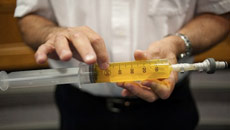A popular but controversial cholesterol drug called Ezetimibe has been found to lower the number of cardiovascular events by 6.4 percent when administered with another cholesterol drug, a new research says.
"The question that everyone had was, would this added lowering of LDL cholesterol translate into a real clinical benefit," said cardiologist Christopher Cannon from the Brigham and Women's Hospital in the US.
"The answer is yes," Cannon added.
The trial that Cannon presented at the American Heart Association's meeting in Chicago, Illinois, Monday had enrolled more than 18,000 patients and took nine years to complete.
Ezetimibe reduces cholesterol absorption by inhibiting the activity of a protein called NPC1L1, which transports free cholesterol into cells.
When combined with a statin, another cholesterol-lowering drug, Ezetimibe lowered cholesterol by an extra 20 percent compared to the statin alone, a report in the scientific journal Nature stated.
In 2008, researchers found that the drug Ezetimibe had no impact on the thickness of artery walls in the neck and thigh - a measure of fatty plaque build-up.
This plaque build-up is thought to contribute to heart disease by restricting blood flow.
Hopes for Ezetimibe were bolstered last week when a genetic analysis of 7,364 people with heart disease and 14,728 controls found that people who had a rare mutation that inactivates the NPC1L1 protein had lower LDL cholesterol levels and a lower risk of coronary heart disease.
"The study affirms the central role of intensive LDL reduction in the prevention of recurrent cardiovascular events," said Neil Stone, a cardiologist at the Northwestern University in Chicago.
But Stone warned that the trial was carried out in high-risk patients, a common practice used to boost the likelihood of cardiovascular events.
"The data does not speak of the use of Ezetimibe in patients with low risk," he added.





